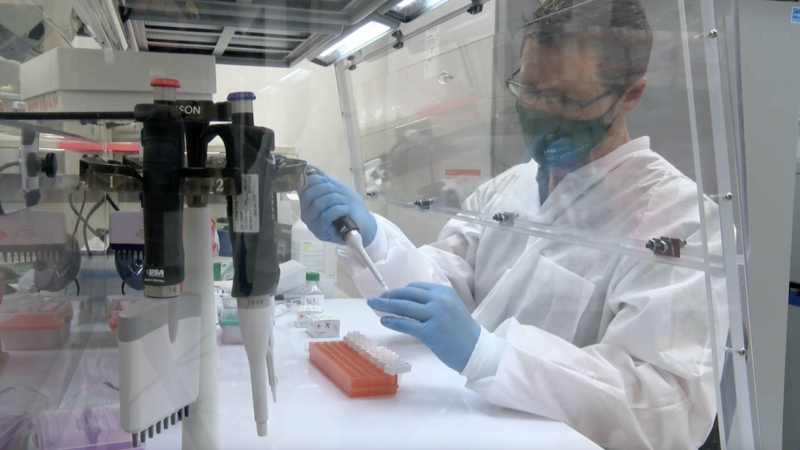175 Down; 3,701 to Go. Jefferson County Starts Chipping Away at Rape Kit Testing Backlog

By Sam Prickett
With the help of a federal grant program, the Jefferson County District Attorney’s office has begun to chip away at the county’s massive backlog of untested sexual assault kits.
About 175 of the county’s more than 3,800 untested kits have been tested as of this month, with officials prioritizing cases that may lead to the capture of serial offenders. They also are taking steps to make sure that such a backlog never happens again, even once the federal grant runs out.
In 2016, the U.S. Department of Justice’s Bureau of Justice Assistance awarded the Jefferson County District Attorney’s Office with a $1.5 million Sexual Assault Kit Initiative grant. The grant would pay for an inventory to be taken of the county’s backlog, as well as to establish a database of the kits and to “develop a common language and protocol for addressing sexual assault countywide,” said Danny Carr, who was then serving as the county’s district attorney pro-tem.
The inventory was finished in September 2017 and found that, out of a total of 4,999 kits in Jefferson County, 3,876 had not been submitted for testing — close to 78 percent. Now, law enforcement officials face the challenge of whittling down that backlog without neglecting new cases — and of changing the mindset that led to the backlog in the first place.
A National Problem
Jefferson County isn’t alone in having such a high number of untested sexual assault kits. It’s a nationwide issue; a recent Associated Press report estimated that 155,000 sexual assault kits currently await testing nationwide, and approximately 100,000 backlogged kits have only recently been tested.
In recent years, the U.S. Department of Justice, along with partners such as the Manhattan District Attorney’s Office, has poured millions of dollars into addressing the problem nationwide, which has resulted in 186 arrests and 64 convictions so far, according to the AP report. In Georgia, which clearedits 3,000-kit backlog in November, testing found evidence linking 321 cases to suspects in other crimes and was key in identifying two serial rapists.
Jefferson County finds itself at the beginning of that process now. While its backlog testing has not yet resulted in indictments or arrests, officials say they have the broader goal of enacting systemic changes to the way law enforcement approaches sexual assault cases.
“Putting All the Pieces Together”
The question of what caused the backlog has no clear answer, officials say. In a statement issued last year, Birmingham Police Chief Patrick D. Smith said a lack of standard procedure for processing the kits played a significant role. “There is no one answer as to how the backlog developed,” he said. “This was a 30-year backlog in the making. There have been changes in process, collection and comparison of evidence throughout that period of time. If systems were in place to handle the backlog right now, we would deliver all of the kits today.”
Representatives from the Birmingham Police Department — which was responsible for 3,391 unsubmitted sexual assault kits, roughly 87 percent of Jefferson County’s backlog — did not respond to requests for comment for this story.
Aryn Sedgwick, the SAKI program director in the Jefferson County D.A.’s office, said that coordinating the county’s various law enforcement agencies is a major part of addressing the root cause of the backlog.
“Honestly, a lot of it is communication,” Sedgwick said. “You’ve got people in busy agencies that are all individually making decisions that represent their agencies and their own perspectives, which is fine. But when you don’t have everyone coming to the table and putting all the pieces together, then you get this miscommunication and a lot of outstanding questions.
“For some departments it was as simple a thing as direct communication,” she said. “Maybe an evidence tech’s job was to take a sexual assault kit from the police evidence storage to the lab, but the detective on the case wasn’t in that communication loop so they didn’t recognize when a kit was being sent. They thought it had been sent (already).”
According to Sedgwick, that communication can be improved relatively easily by simply changing the evidence submission forms used for sexual assault kits. “It can even be something as simple as changing how kits are submitted, how quickly they can be submitted, and making sure that everybody is communicating,” she said. “Then law enforcement knows about it, the D.A.’s office knows about it. Everybody’s aware of what the process is, and it’s not incumbent on an individual.”
“Keep Moving With the Cases That You’ve Got”
One major complication in dealing with the backlog is in making sure that analysis of the old kits does not interfere with processing new cases, a balance that former District Attorney Mike Anderton has described as “very difficult.”
“The Department of Forensic Sciences has fresh cases coming in every day, and you can’t delay the ones coming in (this year) to talk about a case from 1980,” he said last year. “You’ve got to keep moving with the cases that you’ve got.”
Angelo Della Manna, director of the Alabama Department of Forensic Sciences, said the lab receives roughly 100 sexual assault kits from throughout the state per month. “In addition to that amount, we began testing the Jeff Co sexual assault kits last summer and are progressing on conducting forensic testing on those kits submitted to us each and every month since, which we expect to do for the foreseeable future until completed,” he said.
Through the SAKI grant, the Jefferson County D.A.’s office is able to submit 25 backlogged kits for testing per month.
Making sure that the process works as efficiently as possible, Sedgwick said, requires the D.A.’s office to do significant case research on each kit.
“We’re looking at known offenders’ criminal histories, if those parties are still alive, (if) can we locate people — we’re looking at all these sort of factors in terms of what the case will look like down the road toward prosecution,” she said. “The goal of SAKI is to identify serial offenders, so we’re trying to front-load our cases toward finding serial offenders. People who have criminal histories of violent offenses that include rape, those people are going to the front of the line simply so that we can identify more people quicker while we have these resources.”
Jefferson County is nearly two years into its first, three-year SAKI term, a time period that has largely been dedicated to the backlog inventory. That first term will expire in March 2020. Sedgwick said the county will apply for an extension of that grant in 2020. But even so, officials are aware that the funding eventually will stop. “SAKI is not meant to be 20 years of grant funding,” Sedgwick said. “So we’re trying to use the funding we have to identify the most (perpetrators).”
Sedgwick hopes that the impact of SAKI will be felt long after the grant expires, through a shift in the way law enforcement views DNA evidence.
“It is never going to be the only piece of evidence that is going to make the case something that the prosecutor can take to court, but it is an important piece of evidence,” she said. “I think one of the reasons that the backlog (is happening) across the country is that there has never really been a clear understanding of how useful the kits can be. Some jurisdictions get it, some don’t. Some don’t have the resources or training that would allow their officers to see how useful it is. So that’s one of the things that our project is trying to do. We’re trying to bring in the training and show the importance of these kits, and I think if we can make a good argument for clearing cases using these kits, then they’ll be more useful in the future.”
Photo by Herney
The artist behind ‘the worst’ Trump portrait defends her work
The painting, which was commissioned by Republicans, has hung in Colorado's state Capitol since 2019. Trump follows other U.S. presidents who weren't flattered by their depictions.
Are UAB officials mum about grant cuts because they fear a spiteful president?
Cuts to federal research grants could cost UAB $70 million a year, leading to layoffs and economic impacts beyond the campus. Some faculty and area leaders want UAB to be more vocal against the Trump administration cutbacks.
The (artificial intelligence) therapist can see you now
Many AI products claim to deliver mental health therapy, but with little quality control. But new research suggests with the right training, AI can be effective at helping people.
Netanyahu is set to meet Trump to discuss Israeli hostages in Gaza and U.S. tariffs
Israeli Prime Minister Benjamin Netanyahu will meet with President Trump expecting to discuss tariffs, hostages and war in Gaza and other issues.
Colon cancer survivors who exercise regularly live longer
Colon cancer is on the rise in younger people in the U.S. New research shows regular exercise can help survivors live longer — in some cases even longer than people who didn't have cancer.
A young boy safely returned to his family after getting lost at the NYC Marathon
After Nancy Willis finished the New York City Marathon, she went to greet her family, only to discover that her 8-year-old son was missing. After a frantic search, a woman appeared with the boy.








